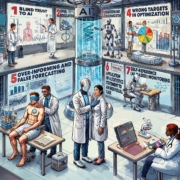The Future of AI starts with You
If we want to achieve a more sustainable and AI-friendly future, we need to start with your individual participation.
Your responses are anonymous and your personal data will not be recorded.
How can you participate?
By filling out this five minute-long and anonymous survey, you can help us in making AI technology more accessible and understandable:
https://forms.gle/DTHmeD9v6XbwXeFn9
Why is that important?
Establishing adaptable and interpretable AI machinery is crucial for individuals and governments to catch up with the speed of technology. Key is not promoting solely development-friendly AI and regulatory overseeing frameworks, but rather working on transparency and readability of technologies through insightful guidelines so that participation for the individual is made possible. This includes the topic of informational self-determination through open legislation frameworks, policies, and ethical guidelines. Both the collective and individual aspect are important for AI technology progression, but a future towards sustainable-friendly AI as an enabler of the 17 sustainable development goals (SDGs) and targets rather than an inhibitor starts with open participation and constant confrontation of the individual with AI technology. One global example that affects us all is ongoing climate change [2], and here we need AI – and the workhorse machine learning (ML) – to contribute to what is clearly the greatest challenge facing humanity. Each and every one of us can contribute to the global challenges of climate change, and we want to explore how AI can help us do that.
[1] Vinuesa, R., Azizpour, H., Leite, I., Balaam, M., Dignum, V., Domisch, S., Felländer, A., Langhans, S. D., Tegmark, M. & Fuso Nerini, F. 2020. The role of artificial intelligence in achieving the Sustainable Development Goals. Nature communications, 11, (233), 1–10, https://doi.org/10.1038/s41467-019-14108-y
[2] Rolnick, D., Donti, P.L., Kaack, L.H., Kochanski, K., Lacoste, A., Sankaran, K., Ross, A.S., Milojevic-Dupont, N., Jaques, N. & Waldman-Brown, A. (2022). Tackling climate change with machine learning. ACM Computing Surveys (CSUR), 55, (2), 1–96, https://doi.org/10.1145/3485128
[3] This page is: https://human-centered.ai/2023/09/21/human-ai-5-minutes-survey
Thank you very much:
Andreas HOLZINGER, Heimo MUELLER, Jianlong ZHOU, Fang CHEN
Human Centered AI Lab Austria and Human-Centered AI Lab Australia



